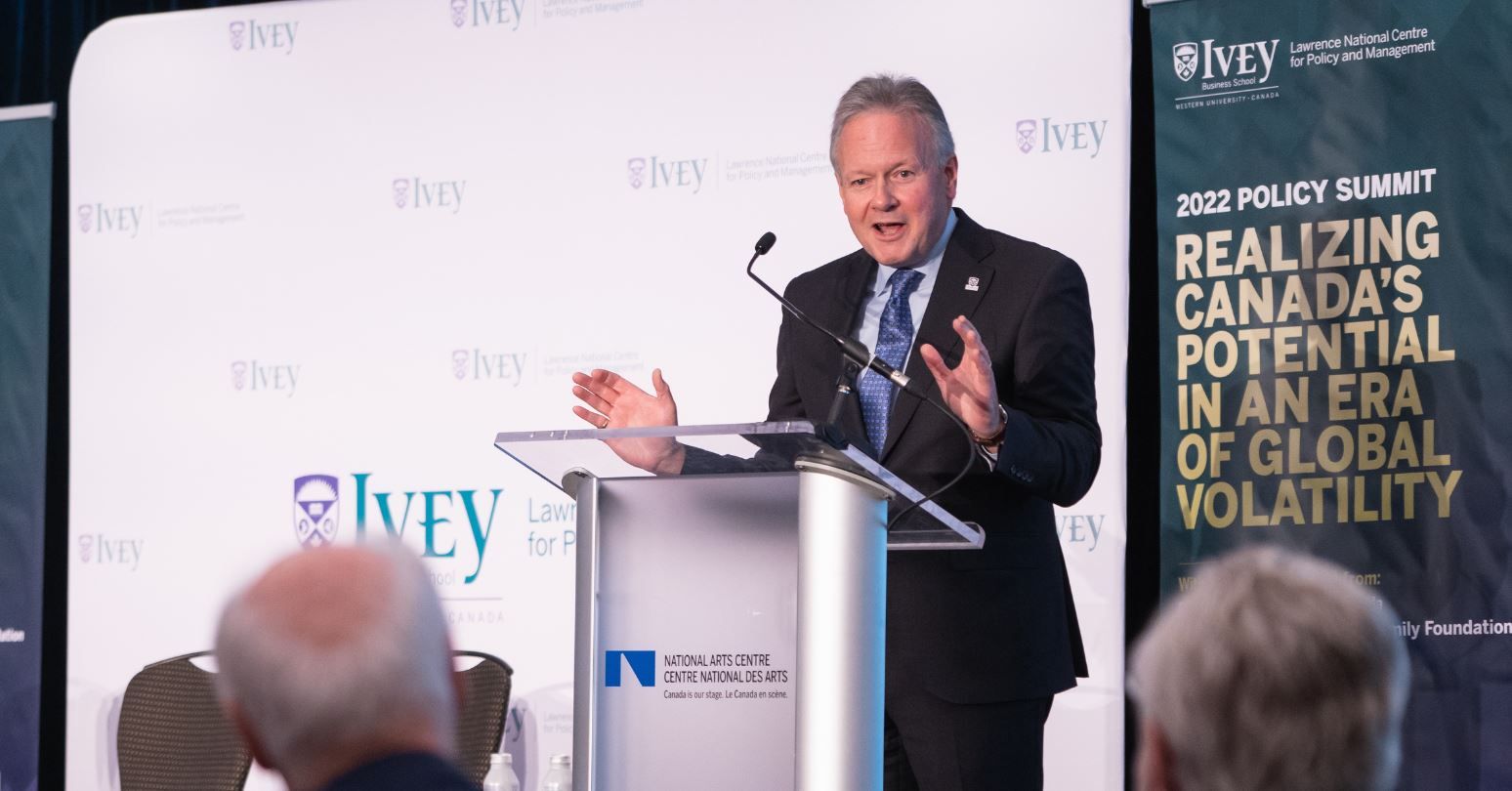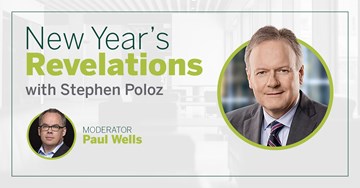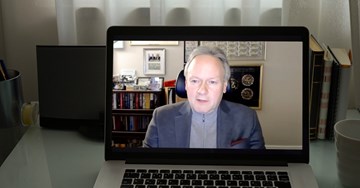Stephen Poloz, the former Bank of Canada governor, highlights that Canada is at a critical juncture in time. With high inflation shrinking pocketbooks, interest rates on the rise, and the unsettling invasion of Ukraine, Canadians are justifiably and understandably worried about the future.
With these hurdles and backdrop in mind, Ivey’s Lawrence National Centre for Policy and Management convened the 2022 Policy Summit – Realizing Canada’s Potential in an Era of Global Volatility. Featuring many of Canada’s brightest policy and corporate leaders, the summit tackled how governments, businesses, and other key stakeholders can build on Canada’s strengths to stimulate sustained socio-economic development during such disruptive times.
Poloz, who is Chair of the Advisory Council of the Lawrence Centre, provided marching orders to panellists and participants to offer actionable policy solutions, encouraging everyone involved to consider an open-minded approach and avoid trying to solve all problems at once.
“We get stuck in the idea that since we can’t boil the ocean, we can’t do anything. So, let’s forget about boiling the ocean today,” he said.
Canada’s potential economic path
Acknowledging that Russia’s invasion in Ukraine could further send rippling effects in the global economy, Poloz noted that the initial shocks to commodity prices, costs of shipping, and supply-chain bottlenecks have dissipated substantially and these are transitory in the sense that they will go away by themselves within the next year or so. In addition, the loss in purchasing power due to higher prices of energy and food is pushing major retailers to compete harder for consumer money, which puts pressure on suppliers to keep prices from rising. Poloz’s best guess: these two factors alone can bring down inflation to four per cent by next year. He said bringing inflation down to three per cent doesn’t sound like a very heroic task, especially since the economy appears to be more sensitive to higher interest rates now than before, and central banks are also conducting quantitative tightening, which is working in the same direction of higher interest rates.
Going forward, Poloz said the dominant theme will be “disinflation relief,” potentially leading to a period of stagflation. Noting that baby-boomers are exiting the labour force in droves, he suggested that the new normal is likely to be one where Canada has fewer workers than in the last 50 years, and the implications of that might be profound. The sustainable path of the economy then, he argued, could be one where “wages are higher, profits are lower, and to make that to a triangle, more investment in labour-saving equipment and higher productivity.” Calling the aging population “a tectonic force working beneath the surface of the economy,” he said policy-makers must take into account such forces in charting their decisions.
Poloz noted that four other tectonic forces – growing indebtedness, technological progress (fourth industrial revolution), rising inequality, and climate change – are expected to interact and intensify in the next 10 to 20 years, creating substantial economic volatility with more frequent recessions and bouts of inflation and deflation.
In this era of global volatility, Poloz advocated for investing in resilience to better manage risk. “In fact, when we are prepared for risk, we will find ways to capitalize on risk,” he said.
Poloz offered his own set of actionable ideas that government can enact quickly and efficiently.
Focus on clarity
Noting that “clarity is the antidote for uncertainty,” Poloz’s first suggestion was for governments to create maximum clarity.
He detailed the uncertainty around trade. Even with a reasonably satisfactory USMCA trade agreement, despite several years of Trump-induced turmoil, Poloz said Canadians should not remain content today. Instead, he said Canada should be building more cross-border commitments with the United States, making investments now before dealing with another potentially hostile [U.S.] administration in the future. Canada should also seek more bilateral agreements and to level the playing field quickly, without time-consuming negotiations.
Another concern for clarity relates to Canada’s NetZero commitments for 2050. Poloz said the current ambiguity around the policy path to NetZero is forcing Canada’s energy sector to live in limbo at the moment, stunting potential investments.
“Clarity would unleash investment in efficiency and carbon capture, new production and export capability, and a huge boost to international security and to Canada’s productivity,” said Poloz.
Pick the low-hanging fruit
Poloz also noted that federal and provincial regulatory differences and trade barriers are weighing down investments and holding back Canada’s productivity growth, and should be one of the first fruits picked off the tree.
“Invest heavily in federal provincial relations. Spend the political capital, whatever it takes to create stronger political incentives, to get things done,” he said.
Another quick win, Poloz suggests, is raising the retirement age to boost economic capacity and create incentives for companies to retain experienced talent.
Build financial buffers
Poloz said it is prudent to prepare for a new pandemic-sized fiscal event every five years and governments would be wise to prepare for the next shock with a fiscal buffer. He suggested that getting federal debt-to-GDP ratio back to 30 per cent will be warranted to build resilience and be ready for the next shocks.
On the whole, Poloz said these are some of the things that governments can usefully do at little to no fiscal cost.
“I think most of them would deliver a fiscal dividend because they would raise the trend growth in Canada, and therefore raise government revenues. So, whatever these measures cost, they would more than pay for themselves,” he said.
Celebrating 20 years of the Lawrence Centre
The 2022 Policy Summit marked the Lawrence Centre’s 20th anniversary and the jam-packed day featured more than 20 esteemed speakers and panellists. In addition to Poloz’s keynote address, the event covered two other major themes, including harnessing innovation and investing in people. It also offered an opportunity to pay tribute to the late Jack Lawrence who was a strong advocate for collaborative approach to policy-making and inspired the establishment of the centre.
All sessions were recorded and the videos will soon be available on the Lawrence Centre’s website.



